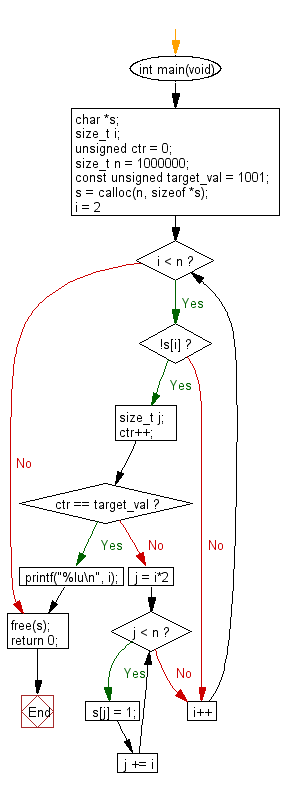C Exercises: Get the 1001st prime number
C Programming Practice: Exercise-23 with Solution
By listing the first six prime numbers: 2, 3, 5, 7, 11, and 13, we can see that the 6th prime is 13.
The first six prime numbers are 2, 3, 5, 7, 11, and 13.
Write a C programming to get the 1001st prime number?
C Code:
#include <stdio.h>
int main(void)
{
char *s;
size_t i;
unsigned ctr = 0;
size_t n = 1000000;
const unsigned target_val = 1001;
s = calloc(n, sizeof *s);
for (i = 2; i < n; i++) {
if (!s[i]) {
size_t j;
ctr++;
if (ctr == target_val) {
printf("%lu\n", i);
break;
}
for (j = i*2; j < n; j += i) {
s[j] = 1;
}
}
}
free(s);
return 0;
}
Sample Output:
7927
Flowchart:

C Programming Code Editor:
Contribute your code and comments through Disqus.
Previous: Write a C programming to find the difference between the sum of the squares of the first one hundred natural numbers and the square of the sum.
Next: Write a C programming to find the thirteen adjacent digits in the 1000-digit number that have the greatest product. What is the value of this product?
What is the difficulty level of this exercise?
Test your Programming skills with w3resource's quiz.
C Programming: Tips of the Day
Static variable inside of a function in C
The scope of variable is where the variable name can be seen. Here, x is visible only inside function foo().
The lifetime of a variable is the period over which it exists. If x were defined without the keyword static, the lifetime would be from the entry into foo() to the return from foo(); so it would be re-initialized to 5 on every call.
The keyword static acts to extend the lifetime of a variable to the lifetime of the programme; e.g. initialization occurs once and once only and then the variable retains its value - whatever it has come to be - over all future calls to foo().
Ref : https://bit.ly/3fOq7XP
- New Content published on w3resource:
- HTML-CSS Practical: Exercises, Practice, Solution
- Java Regular Expression: Exercises, Practice, Solution
- Scala Programming Exercises, Practice, Solution
- Python Itertools exercises
- Python Numpy exercises
- Python GeoPy Package exercises
- Python Pandas exercises
- Python nltk exercises
- Python BeautifulSoup exercises
- Form Template
- Composer - PHP Package Manager
- PHPUnit - PHP Testing
- Laravel - PHP Framework
- Angular - JavaScript Framework
- Vue - JavaScript Framework
- Jest - JavaScript Testing Framework
